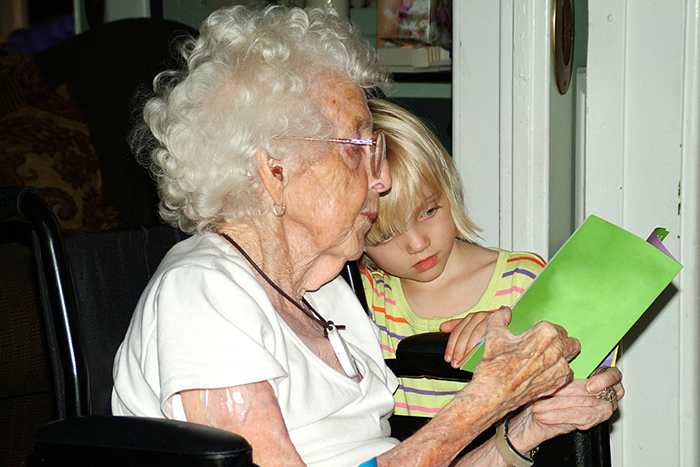Keeping Ageism Out Of the Stacks

I’d already been thinking about the elderly —my father recently had major heart surgery, while other family members and friends have had their own health struggles—and, then I came across Oliver Sachs’s December 14 New York Times column about how Knopf has refused to publish a large-print edition of his newest book. Sachs, a respected neurologist, has been one of America’s best non-fiction authors for decades, but is now elderly and cannot read regular-print books. When he asked about a large-print edition, he was told that one “is not ‘necessary’” because “we have e-books, which allow us to blow up the size of the type as much as we want.”[i] Sachs, though, does not want an e-reader, “which could be dropped in the bath or broken, and which has controls I would need a magnifying glass to see. I want a real book made of paper with print.”
The publisher’s utter disregard in this case is disconcerting, but emblematic of what Katelyn Angell calls our “cultural obsession with youth.”[ii] Unfortunately, this obsession is, in some ways, reflected in our profession. Angell reports that “independent research, personal inquiry among public and academic librarians, and perusal of Master of Library Science graduate programs revealed a highly evident absence both of courses geared toward and positions concentrating solely on serving senior citizens.”[iii] This absence is especially troubling because senior citizens have helped fund libraries for decades and make up nearly one quarter of public library users, with the number poised to grow even larger in the near future.[iv] Most age-specific library programming is aimed towards youth and teens, she notes. I even looked back at my reference text book[v] and found there was practically no information on senior services.
If we consider this trend pragmatically, it has a kind of logic. Both publishing companies and libraries have a vested interest in young readers, in cultivating future customers and patrons. However, an important distinction exists between the two entities. Publishing companies exist for the sake of profit (despite marketing claims to the contrary). Libraries, of course, are service-based and need to be driven by a concern for all patrons, especially those overlooked by popular, consumer culture. The 1999 revised ALA statement on senior patrons even asserts that such service is “not a fad.”[vi]
One area where we can take an important place at the proverbial table, where seniors are concerned, is in teaching computer literacy skills. In prowling blogs and articles on senior citizens and technology, I found that writers on this subject can range from frustratingly flip to rather insightful. One particular blog, posted on Silver Fox Network, was all the more useful because the writer (who does not identify him/herself) shares personal experience in teaching computer skills to seniors. Silver Fox notes that while there are some very real difficulties facing seniors learning computer skills, if we can make the activity interesting and relevant, then “senior people learn better than younger people” because they are “often smarter; many times they are more motivated, and they are genuinely excited about learning.”[vii]
One important difficulty some seniors have stems from the fact that many have a limited exposure to technology in the past. Up until the sixties, the technology gap was much larger than it is today, with many areas still relying on party telephone lines and spotty television service. Thus, many seniors have a kind of hesitancy when approaching computers and other technological devices. Silver Fox offers several excellent suggestions for approaching this hesitancy and notes that it may be helpful to instruct seniors in smaller groups and with other seniors who may not already be computer savvy; such an arrangement could help allay fears by showing the reluctant that their concerns are shared by others. One particular suggestion that I thought was fabulous is to have a computer that can be taken apart to show the learners the actual hardware of a computer—show them the mother board, processor, chips, power supply, etc. This step alone could do a great deal to demystify computers. In my experience, many elderly men are more “mechanical” in their thinking, thus showing them the parts of the machine could go a long way to appealing to their world view. One more hurdle is more cultural in nature: many seniors were raised with the notion that it is more important to be polite than assertive and may not readily ask questions, so librarians have to be observant about body language indicating confusion or misunderstanding and should frequently invite feedback.
I was directed to another good resource by a writer who struck me as otherwise insensitive, a collection of lessons, interactive tutorials, and short video clips on computer literacy, posted by GCFlearnfree.org. This collection is tastefully produced, easy to follow, and could effectively be used in computer basics courses targeted at senior citizens.
Offering good, thoughtful service to senior citizens could be a tremendous plus! Seniors often have more discretionary time than other groups of people and tons of experience that could be shared with the community. If we take the time and effort to serve them well, we could become the means through which they can continue to contribute to their communities and (on a more practical note) we could tap into a loyal and appreciative set of patrons.
[i] Sachs, Oliver. 2012. “Reading the Fine Print.” http://www.nytimes.com/2012/12/16/books/review/reading-the-fine-print.html?ref=books&_r=0, accessed 24 Dec 2012
[ii] Angell, Katelyn. 2009. “Boom or Bust: The Need for Senior Services Librarians,” Progressive Librarian 32, p. 29-35. Web. http://www.progressivelibrariansguild.org/PL_Jnl/contents32.shtml (available as .pdf; accessed 26 Dec 2012) p. 34.
[iii] Angell, p. 29
[iv] Angell, p. 33
[v] Cassell, Kay Ann & Hiremath, Uma. 2011. Reference and Information Services in the 21st Century: An Introduction, 2nd edition. Neal-Shusterman Publishers, New York.
[vi] Qtd. In Angell, p. 31
[vii] Silver Fox Network. 2012. “Teaching Senior Citizens about Computers.” Http://www.silverfoxnetwork.com/teaching-senior-citizens-about-computers, accessed 30 Dec 2012
Tags: elderly, large print












